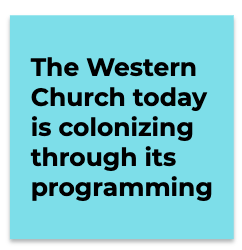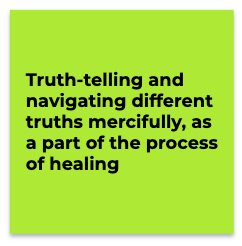A Journey through our Collective Reflections
Nina Mantalaba
At the beginning of 2020, I began work as an administrative intern with INFEMIT. Joining INFEMIT meant meeting and learning alongside scholars and practitioners committed to addressing the urgent realities of our world in light of the message of the Gospel. It was an online opportunity for me to connect and learn, with plans for an upcoming forum that would bring us together in-person – how cool!
COVID-19 changed those plans. In March, I found myself in lockdown, brainstorming ideas to hold the 2020 Stott-Bediako forum on Peace-building and Conflict Transformation from a lens of Post-Colonialism and Indigenous Christianity on an online platform. What could this look like? Would it be possible? Could we lead and generate community online? Could we truly be ‘together’ in this time that felt so isolating? This felt like a daunting task, and at the time, a shadow of true embodied fellowship and community.
However, the process of curating and attending the forum remotely was extremely rich. I found that my first Stott-Bediako forum exemplified ‘living in tension’ for me – between lament and joy, between recognizing the dark pasts of colonialism and the continuing oppressive realities of today, and looking forward to the Hope of the future transformation. In this article, I offer a short reflection that demonstrates a process of growing and learning together despite physical distance, as I weave together my own discoveries and the questions and reflections offered by participants throughout the forum (shown on digital post-its).
Remembering Together
This past year was one in which I felt often disappointed by the responses and actions of the Church. It seemed as if every day there was a new headline highlighting evangelicals’ denial of the reality of a pandemic that exposed existing unjust systems. The evangelical Church consistently demonstrated a failure to recognize past and current divisions and oppression, a complicity in racial violence, and a form of Christian Nationalism that glorifies power. It often felt isolating for me to read the news and lament alone, apart from the Christ-centered communities in which I usually process these events. But as I brought my sadness to the forum, I saw communal frustration and lament expressed in several of the contributions and discussions. Together, we wrestled with past and present colonialism, violence, and oppression in our communities. Though painful, I saw over and over again that remembering our past is necessary in order to redeem the future. Moreover, I witnessed the power of lamenting together as a community.
Creating Together
Starting from this posture of communal lament, we then pictured together a reconciled and whole Church. The forum expressed hope in art, poetry, and stories that demonstrate restorative practices around the globe that put Christ at the center of transformation. Listening to diverse stories and indigenous perspectives on theology allowed us to gain deeper understandings of reconciliation and repentance, as well as a reframing of mission. This forum and the fellowship allowed me to engage with others around the globe who find their hope and transformation not in a God of conquest, expansion, and hierarchy, but in the Jesus who broke bread with the marginalized, poor, and sick. Together, we saw beauty in creation: in creating art, in caring for God’s creation, and in the process of creating partnerships and restoring broken relationships.
Committing Together
At the close of the Stott-Bediako forum, I found myself in a period of renewed curiosity and hope. Despite the physical distance, this online forum allowed me to feel the true fellowship of a faith community. I felt blessed to have heard and learned from so many wise scholar-practitioners from various contexts. Though the forum left me with more questions than answers, I was reminded of the phrase that we often referred to over the course of the sessions: “this is a process, not an event; a conversation, not a final word.” The forum’s conclusion was not an end, but rather an invitation to continue journeying together as we carry commitments and questions with us to our own communities.
These days, I find myself more comfortable sitting in the tension between Joy and Lament, recalling our dark pasts in light of a hopeful future, and continuing these discussions in fellowship in order to inspire transformation.



























Leave a Reply